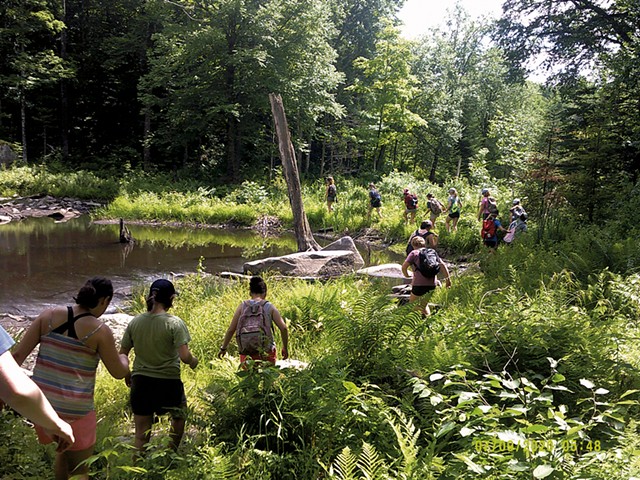
- Courtesy
- Campers at Green Mountain Conservation Camp at Buck Lake in Woodbury
If you want to get your child off the screen and into the woods this summer, there are many camps to choose from. Many of them offer an up-close experience with nature. But those experiences vary dramatically, and it's important to understand how before you put down a deposit.
Some years ago, I spent a week with family and friends at a family camp that had a nature-y name. We had so much fun that week, but I can still remember my friend Pete, one of the best naturalists I know, saying plaintively at one point, "Oh, sure, everybody here likes nature, but do they actually know anything about nature or actually do anything in nature?"
We had been swimming and hiking all week, but nobody there (besides Pete) was really investigating our surroundings. Pete told us about his experience as a staffer at the Burgundy Center for Wildlife Studies in West Virginia, a summer camp where he had worked after college and taught kids hard-core nature skills.
Last year, my family found the Vermont version of the Burgundy Center: Green Mountain Conservation Camp, an overnight program for 12- to 16-year-olds run by the Vermont Fish & Wildlife Department. Each year, nearly a thousand campers — 90 percent of them Vermonters — attend weeklong camps at one of two locations: Buck Lake in Woodbury and Kehoe Camp in Castleton. Each site hosts single-sex sessions for girls and boys; each session costs just $250 to attend, and scholarships are available.
GMCC has been running the programs since 1966. Campers learn lessons in botany, aquatic ecology, hunting, trapping and fishing. Fish & Wildlife director of outreach Ali Thomas described the core curriculum as "nature connection."
The counselors are called natural resource instructors, and Thomas noted that working there is "not your usual after-high-school gig." These adults tend to be in their mid-twenties and often have degrees in natural resources. State game wardens, wildlife biologists and foresters also share their expertise with campers. The lessons "come straight from the people who bleed this stuff," Thomas said. "There's so much love in the curriculum, and you can't teach that and you can't prescribe it." Sounds just like what my friend Pete described at his camp.
GMCC offers a very structured experience. Thomas noted, "It's a more rigorous education than a craft, play, laissez-faire-style camp."
My son enjoyed his time at a basic camp session as a 13-year-old. He came home with various certifications — hunter firearms training, bowhunter education — but when I asked him what stood out most, swimming, belly flops and the mud were some of the first things he mentioned. He also liked sleeping in a cabin and the voluminous food choices the cafeteria offered. When it came time to sign up for an advanced session this year, he was all in.
But that kind of organized approach isn't the only way to appreciate the outdoors. Recently I read Naturalist: A Graphic Adaptation by the biologist Edward O. Wilson, Jim Ottaviani and C.M. Butzer. "A child comes to [nature] with a mind prepared for wonder," Wilson says. "Hands-on experience at the critical time, not systematic knowledge, is what counts in the making of a naturalist."
Wilson describes a key summer he spent on the ocean as a child and concludes, "Better that summer ... was not an educational exercise planned by adults."
The experience Wilson describes seems similar to the offerings of Crow's Path, an educational nonprofit that runs camps and weekly field school programs at Burlington's Rock Point. My son has been attending them since he was in first grade. Crow's Path gets kids out in the woods and on the shores of Lake Champlain. But what they do there is up to them.
I asked youth programs director Ross Doree about the difference between Crow's Path and nature camps like GMCC. He suggested that camps like GMCC followed a "planned" curriculum, whereas Crow's Path's curriculum is "emergent." "In emergent curriculum, the games are more likely a product of the weather and season and the kids themselves. And by engaging with those things spontaneously, there will be any number of smaller lessons and experiences that educators can highlight," Doree said.
My friend Susan, mother of two Crow's Pathers, attended the field school with her children for a semester some years ago. When I asked her about the experience, she told me there was a strong rhythm to each day, but the adult mentors were open to what students wanted to do, whether it was going on a hike, building a shelter, identifying animal tracks or carving spoons out of downed tree branches.
Because there was no set agenda for the day, participants had to ask themselves what they were in the mood to do. "It forces a sort of introspection, which can be vulnerable and awkward but deeply satisfying," Susan said. "It allows us to grow the 'invisible' skills of self-direction, intuition and deep listening."
When I asked my son whether he learned a lot at GMCC, he nodded emphatically. What about? "Hunting and fishing and how to identify fish and how to gut an animal," he told me. When I asked whether he'd picked up lessons at Crow's Path, he nodded more slowly but then said, "Definitely." What did he learn there? "How to be in the woods."
We're fortunate in Vermont to have access to so many programs that teach kids to be comfortable outdoors. In addition to these two, there are many others, including New Village Farm Camp and Camp Bread & Butter in Shelburne, North Branch Nature Center in Montpelier, and Nature Explorers Camp at Bonnyvale Environmental Education Center in West Brattleboro. As you consider the options, think about which approach is right for your child, and ask camp staff about how activities are structured.
Whether programs are planned or emergent, focused on goals and knowledge or on passion and connection, they're giving kids an experience that's harder and harder to get in our technology-driven society. Not every camp teaches the same lessons about nature, but right now I think we need them all.
Find more information about the camps mentioned here:
- Camp Bread & Butter
- Crow's Path
- Green Mountain Conservation Camp
- Nature Explorers Camp at Bonnyvale Environmental Education Center
- New Village Farm
- North Branch Nature Center
Find more nature camps in the Summer Camp Guide.











Comments
Comments are closed.
From 2014-2020, Seven Days allowed readers to comment on all stories posted on our website. While we've appreciated the suggestions and insights, right now Seven Days is prioritizing our core mission — producing high-quality, responsible local journalism — over moderating online debates between readers.
To criticize, correct or praise our reporting, please send us a letter to the editor or send us a tip. We’ll check it out and report the results.
Online comments may return when we have better tech tools for managing them. Thanks for reading.